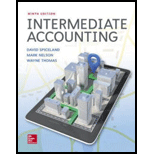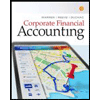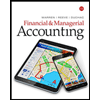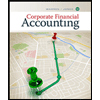
Intermediate Accounting
9th Edition
ISBN: 9781259722660
Author: J. David Spiceland, Mark W. Nelson, Wayne M Thomas
Publisher: McGraw-Hill Education
expand_more
expand_more
format_list_bulleted
Question
Chapter 21, Problem 21.7BE
To determine
Statement of
Journal: Journal is the method of recording monetary business transactions in chronological order. It records the debit and credit aspects of each transaction to abide by the double-entry system
Rules of Debit and Credit:
Following rules are followed for debiting and crediting different accounts while they occur in business transactions:
- Debit, all increase in assets, expenses and dividends, all decrease in liabilities, revenues and stockholders’ equities.
- Credit, all increase in liabilities, revenues, and stockholders’ equities, all decrease in assets, expenses.
To Journalize: The given transaction of Company M, to determine the amount related to the note.
Expert Solution & Answer
Want to see the full answer?
Check out a sample textbook solution
Students have asked these similar questions
Trial Balance
Rocky Mountain Tours Co. is a travel agency. The nine transactions recorded by Rocky Mountain Tours during June 20Y2, its first month of operations, are
indicated in the following T accounts:
Cash
(1) 40,000 (2) 4,000
(7) 13,100 (3) 5,000
(4) 6,175
(6) 6,000
(9) 1,500
Equipment
(3) 15,000
Dividends
(9) 1,500
Accounts Receivable
Accounts Payable
Service Revenue
(5) 20,500 (7) 13,100
(6) 6,000 (3) 10,000
(5) 20,500
Supplies
(2) 4,000 (8) 2,200
Common Stock
Operating Expenses
(1) 40,000
(4) 6,175
(8) 2,200
Q1:
Wyatt Company had three intangible assets at the end of 2024 (end of the fiscal year):
Computer software and Web development technology purchased on January 1, 2024, for $70,000. The technology is expected to have a useful life of four years.
A patent purchased from R. Jay on January 1, 2024 for a cash cost of $6,000. Jay had registered the patent with the Canadian Intellectual Property Office seven years earlier on January 1, 2017. The cost of the patent is amortized over its legal life.
A trademark that was internally developed and registered with the Canadian government for $13,000 on November 1, 2023. Management decided that the trademark has an indefinite life.
Required:
1. What is the acquisition cost of each intangible asset?
tech 70k
patent 6k
trademark 13k
2. Compute the amortization of each intangible asset at December 31, 2024. The company does not use contra accounts. (Round the final answers to the nearest whole dollar.)
tech 17.5k
patent: ????
3-a.…
Q1:Wyatt Company had three intangible assets at the end of 2024 (end of the fiscal year):
Computer software and Web development technology purchased on January 1, 2024, for $70,000. The technology is expected to have a useful life of four years.
A patent purchased from R. Jay on January 1, 2024 for a cash cost of $6,000. Jay had registered the patent with the Canadian Intellectual Property Office seven years earlier on January 1, 2017. The cost of the patent is amortized over its legal life.
A trademark that was internally developed and registered with the Canadian government for $13,000 on November 1, 2023. Management decided that the trademark has an indefinite life.
Required:
1. What is the acquisition cost of each intangible asset?tech 70kpatent 6ktrademark 13k
2. Compute the amortization of each intangible asset at December 31, 2024. The company does not use contra accounts. (Round the final answers to the nearest whole dollar.)tech 17.5k
patent: ????
3-a. Compute the amount of…
Chapter 21 Solutions
Intermediate Accounting
Ch. 21 - Effects of all cash flows affect the balances of...Ch. 21 - Prob. 21.2QCh. 21 - Prob. 21.3QCh. 21 - Prob. 21.4QCh. 21 - Prob. 21.5QCh. 21 - Prob. 21.6QCh. 21 - Prob. 21.7QCh. 21 - The sale of stock and the sale of bonds are...Ch. 21 - Does the statement of cash flows report only...Ch. 21 - Prob. 21.10Q
Ch. 21 - Perhaps the most noteworthy item reported on an...Ch. 21 - Prob. 21.12QCh. 21 - Given sales revenue of 200,000, how can it be...Ch. 21 - Prob. 21.14QCh. 21 - When determining the amount of cash paid for...Ch. 21 - Prob. 21.16QCh. 21 - When using the indirect method of determining net...Ch. 21 - Prob. 21.18QCh. 21 - Prob. 21.19QCh. 21 - Where can we find authoritative guidance for the...Ch. 21 - U.S. GAAP designates cash outflows for interest...Ch. 21 - Prob. 21.1BECh. 21 - Prob. 21.2BECh. 21 - Prob. 21.3BECh. 21 - Prob. 21.4BECh. 21 - Prob. 21.5BECh. 21 - Prob. 21.6BECh. 21 - Prob. 21.7BECh. 21 - Prob. 21.8BECh. 21 - Investing activities LO215 Carter Containers sold...Ch. 21 - Financing activities LO216 Refer to the situation...Ch. 21 - Prob. 21.11BECh. 21 - Prob. 21.12BECh. 21 - Classification of cash flows LO213 through LO216...Ch. 21 - Determine cash paid to suppliers of merchandise ...Ch. 21 - Determine cash received from customers LO213...Ch. 21 - Prob. 21.4ECh. 21 - Prob. 21.5ECh. 21 - Prob. 21.6ECh. 21 - Determine cash paid for bond interest LO213...Ch. 21 - Determine cash paid for bond interest LO213 For...Ch. 21 - Determine cash paid for income taxes LO213...Ch. 21 - Prob. 21.10ECh. 21 - Prob. 21.11ECh. 21 - Installment note; statement of cash flow effects ...Ch. 21 - Prob. 21.13ECh. 21 - Identifying cash flows from investing activities...Ch. 21 - Prob. 21.15ECh. 21 - Prob. 21.16ECh. 21 - Indirect method; reconciliation of net income to...Ch. 21 - Spreadsheet entries from statement of retained...Ch. 21 - Prob. 21.19ECh. 21 - Prob. 21.20ECh. 21 - Cash flow s from operating activities (direct...Ch. 21 - Indirect method; reconciliation of net income to...Ch. 21 - Prob. 21.23ECh. 21 - Cash flows from operating activities (indirect...Ch. 21 - Prob. 21.25ECh. 21 - Cash flow s from operating activities (indirect...Ch. 21 - Prob. 21.27ECh. 21 - Prob. 21.28ECh. 21 - Prob. 21.29ECh. 21 - Prob. 21.30ECh. 21 - Prob. 21.31ECh. 21 - Prob. 21.32ECh. 21 - Prob. 21.1PCh. 21 - Statement of cash flows; direct method LO213,...Ch. 21 - Prob. 21.3PCh. 21 - Statement of cash flows; direct method LO213,...Ch. 21 - Statement of cash flows; direct method LO213,...Ch. 21 - Cash flows from operating activities (direct...Ch. 21 - Prob. 21.7PCh. 21 - Cash flows from operating activities (direct...Ch. 21 - Cash flows from operating activities (direct...Ch. 21 - Prob. 21.10PCh. 21 - Prepare a statement of cash flows; direct method ...Ch. 21 - Prob. 21.12PCh. 21 - Prob. 21.13PCh. 21 - Statement of cash flows; indirect method; limited...Ch. 21 - Integrating problem; bonds; lease transactions;...Ch. 21 - Statement of cash flows; indirect method LO214,...Ch. 21 - Prob. 21.17PCh. 21 - Statement of cash flows; indirect method LO214,...Ch. 21 - Prob. 21.19PCh. 21 - Prob. 21.20PCh. 21 - Prob. 21.21PCh. 21 - Prob. 21.1BYPCh. 21 - Prob. 21.2BYPCh. 21 - Research Case 213 Information from cash flow...Ch. 21 - Analysis Case 215 Smudged ink; find missing...Ch. 21 - Real World Case 216 Analyze cash flow activities;...Ch. 21 - Prob. 21.7BYPCh. 21 - Prob. 21.8BYPCh. 21 - Research Case 219 FASB codification; locate and...Ch. 21 - IFRS Case 2110 Statement of cash flows...Ch. 21 - Prob. CCTC
Knowledge Booster
Learn more about
Need a deep-dive on the concept behind this application? Look no further. Learn more about this topic, accounting and related others by exploring similar questions and additional content below.Similar questions
arrow_back_ios
SEE MORE QUESTIONS
arrow_forward_ios
Recommended textbooks for you
 Cornerstones of Financial AccountingAccountingISBN:9781337690881Author:Jay Rich, Jeff JonesPublisher:Cengage Learning
Cornerstones of Financial AccountingAccountingISBN:9781337690881Author:Jay Rich, Jeff JonesPublisher:Cengage Learning Corporate Financial AccountingAccountingISBN:9781305653535Author:Carl Warren, James M. Reeve, Jonathan DuchacPublisher:Cengage Learning
Corporate Financial AccountingAccountingISBN:9781305653535Author:Carl Warren, James M. Reeve, Jonathan DuchacPublisher:Cengage Learning Financial & Managerial AccountingAccountingISBN:9781337119207Author:Carl Warren, James M. Reeve, Jonathan DuchacPublisher:Cengage Learning
Financial & Managerial AccountingAccountingISBN:9781337119207Author:Carl Warren, James M. Reeve, Jonathan DuchacPublisher:Cengage Learning Corporate Financial AccountingAccountingISBN:9781337398169Author:Carl Warren, Jeff JonesPublisher:Cengage Learning
Corporate Financial AccountingAccountingISBN:9781337398169Author:Carl Warren, Jeff JonesPublisher:Cengage Learning

Cornerstones of Financial Accounting
Accounting
ISBN:9781337690881
Author:Jay Rich, Jeff Jones
Publisher:Cengage Learning

Corporate Financial Accounting
Accounting
ISBN:9781305653535
Author:Carl Warren, James M. Reeve, Jonathan Duchac
Publisher:Cengage Learning

Financial & Managerial Accounting
Accounting
ISBN:9781337119207
Author:Carl Warren, James M. Reeve, Jonathan Duchac
Publisher:Cengage Learning

Corporate Financial Accounting
Accounting
ISBN:9781337398169
Author:Carl Warren, Jeff Jones
Publisher:Cengage Learning
7.2 Ch 7: Notes Payable and Interest, Revenue recognition explained; Author: Accounting Prof - making it easy, The finance storyteller;https://www.youtube.com/watch?v=wMC3wCdPnRg;License: Standard YouTube License, CC-BY